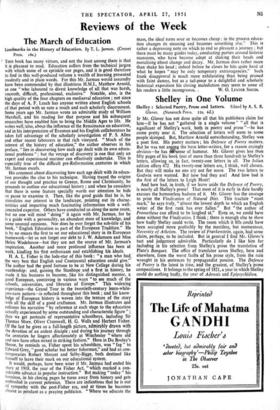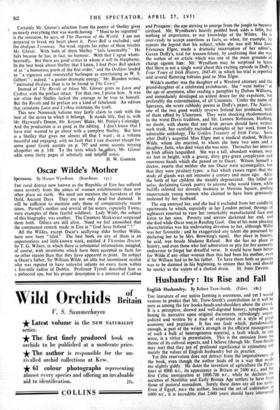Shelley in One Volume
Shelley : Selected Poetry, Prose and Letters. Edited by A. S. B. Glover. (Nonesuch Press. 223. 6d.) IF Mr. Glover has not done quite all that his publishers claim for him—if he has not " gathered in a single volume " " all that is significant of Shelley's work, both in poetry and prose "—he has come pretty near it. The selection of letters will seem to some people skimped. But, Matthew Arnold notwithstanding, Shelley was a poet first. His poetry matters ; his Defence of Poetry matters. But he was not atwg the born letter-writers, for a reason cryingly obvious—he has Msense of humour. Mr. Glover gives less than fifty pages of his book (out of more than three hundred) to Shelley's letters, allowing us, in fact, twenty-one letters in all. The Julian edition offers 472. His twenty-one letters are, I think, well chosen. But they will make no one cry out for more. The two letters to Godwin were wanted. But how bad they are! And how bad is the first of the letters to Leigh Hunt! And how bad, in truth, if we leave aside the Defence of Poetry, is nearly all Shelley's prose! That most of it is early in date hardly excuses the humourless badness of it. Mr. Glover has the courage to print the Vindication of Natural Diet. This tractate " must mark," he says truly, "almost the lowest depth to which an English writer of the first rank has ever fallen." But " the author of Pronzetheus can afford to be laughed at." Even so, we could have done without the Vindication. I think ; there is enough else to show how badly Shelley could write. The room which it fills could have been occupied more profitably by the meritless, but momentous, Necessity of Atheism. The review of Frankenstein, again, had some claim, perhaps, to be included. But in general I find Mr. Glover's tact and judgement admirable. Particularly do I like him for including in his selection from Shelley's prose the translation of Plato's Banquet. The office of translator saves Shelley, here and elsewhere, from the worst faults of his prose style, from the ruin wrought in his sentences by propagandist passion. The Defence of Poetry is the latest in time, and the greatest, of Shelley's prose compositions. It belongs to the spring of 1821, a year in which Shelley could do nothing badly, the year of Adonais and Epipsychidion. Certainly Mr. Glover's selection from the poetry of Shelley gives us nearly everything that was worth having. " Most to be regretted " is the omission, he says, of The Daemon of the World. 1 am not prepared to break my heart about it. Peter Bell is excluded ; and the Oedipus Tyrantts. No weak regrets for either of these trouble Mr. Glover. With both of them Shelley " fails lamentably." He fails because he has, in fact, no humour. With that I agree whole- heartedly. But there are good critics to whom it will be blasphemy. In the best book about Shelley that I know, I find Peter Bell spoken of as " a humorous poem of the first order," and the Oedipus lauded as "a vigorous and resourceful burlesque as entertaining as W. S. Gilbert "; indeed, "a gustier dramatic energy." Mr. Blunden writes, "animated Oedipus than is to be found in The Cenci."
Instead of The Revolt of Islam Mr. Glover gives us Laon and Cythita. with the preface intact. For that, too, 1 praise him. It was not often that Shelley lacked the courage to be true to himself. But the Revolt and its preface are a kind of falsehood. An edition that reinstates Laon and Cythna reinstates the truth.
This new Nonesuch volume may fairly claim to rank with the best of the series to which it belongs. It stands fitly, that is, with Mr. Hayward's Donne, Mr. Keynes' Blake, Mr. Potter's Coleridge. And the production is as good as the editing. I don't know that I have ever wanted to go about with a complete Shelley. But here is a Shelley that gives me almost all that I want ; in a volume beautiful and engaging, with no fault that I can discover except for some queer Greek accents on p. 797 and some accents missing altogether on p. 140. To the texts which he.qffers, Mr. Glover adds some thirty pages of scholarly and helpftil notes.
H. W. GARROD.



































 Previous page
Previous page